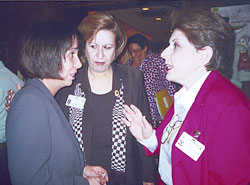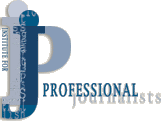Arab Women Journalists Slam Palestine/Iraq Sieges, Urge Skills Upgrade
— by Magda Abu-Fadil
Originally published in “Al-Raida,” quarterly journal of the Institute for Women's Studies in the Arab World, Lebanese American University, Volume XX, No. 99, Fall 2002/2003.

Princess Basma Bint Talal, Honorary Chair of the Arab Women Media Center in Amman; Mahassen Al Emam, Director of the AWMC; Magda Abu-Fadil.
![[Photo]](maftm.jpg)
Magda Abu-Fadil reported on press freedom in Lebanon.
Beirut, November 2002 — Arab women journalists meeting in Jordan this fall slammed the siege laid on Arab reporters in Palestine and Iraq and called for training programs to upgrade practitioners' technical skills and optimization of the Arab Women Media Center's (AWMC) website, notably through an online newsletter in Arabic and English.
"Participants hailed the struggle, courage and steadfastness of Palestinian women and journalists against Israeli aggression and denounced continued American aggression against the Iraqi people," read the Petra Declaration at the end of the conference.
It also praised Syrian women's struggle in the occupied Golan Heights and Lebanese women's resistance in the Sheba'a Farms area.
The four-day conference organized by the Amman-based AWMC, under the patronage of Princess Basma bint Talal, drew 35 participants from various countries, except the occupied Palestinian territories, where Israeli forces had barred journalists from attending.
Another 55 Jordanian women journalists took part in the event October 24-27, 2002 that included sessions held in the historic city of Petra and a visit to the Red Sea port of Aqaba.
"We're proud of what Arab women journalists have accomplished to date but the road ahead is still long as there are many challenges and pressing issues to be tackled," said Princess Basma, the AWMC's honorary chairwoman, at the opening ceremony. "They include a clear media vision to deal with women's issues far from seasonal upheavals and hesitance."
She also praised Arab women journalists' efforts to advance the cause by denouncing stereotyping and by focusing on issues such as politics, economics, culture, and the featuring of women excelling in these domains.
Princess Basma noted that the greatest challenge was overcoming the distorted portrayal of Arab and Muslim women in Western media, which she said required organized and sustained efforts.
"You, my sisters, are best qualified to convey the true image of self-confident Arab women and to take part in correcting this distorted picture of our Arab and Islamic society," she said.
In her own welcoming address, AWMC director Mahasen Al Emam said democracy and respect for basic human rights, as well as guarantees for human beings to exercise freedom of expression, were no longer a choice, if Arabs sought the recognition they deserved among the world's nations.
"Freedom is at the core of the profession of journalism," she added. "When we speak of press freedom, we're not just talking of a professional issue or a privilege. What counts is citizens' right to obtain true, objective and impartial media service."
Al Emam should know. She was the recipient of the 2002 Knight International Press Fellowship Award, to honor her outstanding work under difficult and sometimes dangerous circumstances.
Al Emam was the first female editor-in-chief of a Jordanian newspaper in 1994, two decades after breaking into the male-dominated field, and has stood out for her defiance of government restrictions and for covering the Iran-Iraq war on her own when her newspaper's management refused to send her.
She established the AWMC, a non-governmental organization, in 1999 to help train women journalists, provide networking opportunities and organize gatherings geared towards empowering these media professionals.
Al Emam's efforts have resulted in two conferences for Arab women journalists and a series of training workshops all aimed at improving the lot of those in print, broadcast and online media.
Papers and presentations during the second conference in October 2002 dealt with press laws in the Arab world and their impact on women, various obstacles faced by the media, the role of women journalists in advocating human rights, war reporting, online journalism and the media's role under occupation.

